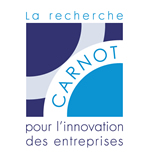Packaging
These businesses provide packaging products and services that enable products to be conserved, protected and transported for consumption by households, craftsmen and industrial companies, etc.
Examples of partnerships with companies in the sector
Verallia has adopted a digital twin to train people in key machine maintenance on its continuous production line
Partnership Carnot ARTS - VeralliaAs demand for glass packaging increases, production units are working day and night. Thanks to Carnot ARTS, Verallia now has a virtual training application for preparing maintenance work on a crucial component: the gas mixer that powers its furnaces.
Verallia has adopted a digital twin to train people in key machine maintenance on its continuous production line
Supporting Innovation
Verallia’s plant in Chalon-sur-Saône supplies glass containers to agri-food businesses and is home to the Verallia France Glass School, created to meet the specific needs of this industry. The plant has a single air/gas mixer that powers all of the glass melting burners. The slightest incident affects both production and delivery schedules. While the technicians who work on the mixer maintenance have obviously received theoretical training, it is not possible to make the mixer available to train them in how to handle specific incidents. To show technicians what to do in the event of breakdowns or damage, Institut Carnot ARTS has created a special simulator with a digital twin of the technical equipment that reproduces not only the machine, but all of the possible interactions as well.
The client needs
Verallia is an independent group with around 10 000 employees and 32 glass manufacturing plants spread throughout 11 countries. It is European leader – and the world's third largest producer – of glass packaging for beverages and food products. Verallia provides innovative, customized and eco-friendly solutions for more than 10 000 businesses worldwide. To meet growing demand, the Group is focused on adapting its existing production lines and is harnessing AI to bring it into the Industry 4.0 era. In the absence of a national glass manufacturing sector, Verallia founded its own Glass School over 50 years ago and approached the Carnot ARTS Image Institute to create an interactive simulation of work on the mixer with a view to training operators. During training sessions, the simulator is brought to life by a virtual reality mask that displays a simplified but functional replica of the machine, allowing operators to gain a better understanding of how the actual system works and the machine’s reactions.
Partnership
Institut Image is the part of Carnot ARTS that specialises in virtual immersion techniques. To design the simulator, it first had to analyse this complex process in order to define the appropriate level of simplification that would make the application functionally representative and faithful to the real system. The operator is thus immersed in a representation of the machine together with realistic possible interactions.
To develop this special digital twin, scientific obstacles needed to be removed, in particular to identify the correct cognitive load. This allows the operator to focus on the task in hand – a must for ensuring the relevance of the learning application. This is the case when operators have to move around so that neither task specialization nor unnecessary movements distract them, and during interactions with the virtual system to ensure that they have a clear idea of how to manipulate the different components.
The partnership has provided Verallia with an effective learning tool that limits the scope for incidents affecting a key component of its production process.
Malengé Packaging produces flexible packaging that meets the recyclability requirements that now apply in the agri-food industry
Partnership Carnot Institute PolyNat - Malengé PackagingDry foods can now be protected from light, oxygen and humidity by a really light and totally recyclable paper container made from virgin fibres, developed in partnership with CTP (Carnot PolyNat).
Malengé Packaging produces flexible packaging that meets the recyclability requirements that now apply in the agri-food industry
Dry foods can now be protected from light, oxygen and humidity by a really light and totally recyclable paper container made from virgin fibres, developed in partnership with CTP (Carnot PolyNat).
Supporting Innovation
Packaging has been identified as a major cause of pollution due to the difficulties inherent in sorting and recycling a complex product made from materials with very different life cycles. Under French EPR regulations, producers must design their packaging in a way that reduces its impact on the environment once it is processed as waste. Malengé Packaging’s commercial offering is made from a mono-material paper base with barrier properties conferred by functional printing processes. Optimal sealing and surface treatment properties reduce its weight by between 15% to 40% of equivalent-type packaging with a plastic or aluminium layer. The result is a container that is compatible with the paper recycling chain while affording excellent protection to products. Overall, the carbon footprint can be up to 60% smaller than existing solutions on the market.
The client needs
Malengé Packaging is a one hundred-year-old company based in the Hauts de France region of Northern France and specialising in offset printing. Since 2000, it has been harnessing its expertise to the emerging flexible packaging market, where it has become a reference, particularly for organic products, coffee and seeds. The company has invested in the search for a solution that would enable manufacturers to comply with their environmental commitments in terms of packaging. Malengé wishes to develop a flexible packaging offering that uses processes and materials from the paper industry. It is based on 100% recyclable barrier paper whose components must all be optimized to meet the imperatives of cutting down on both materials and weight. It was as part of a joint research lab (ANR-LAB3P), bringing together Malengé Packaging and the Pulp and Paper Research and Technical Centre (CTP), that these two long-standing partners made this project a reality by developing the Cycle Pack range, based around a material recognised as being recyclable by CEREC (French committee for evaluating the recyclability of paper-cardboard packaging). ANR-LAB3P was set up in 2016 and by 2018 it had already come up with a commercial product that met the requirements of a first customer. Cycle Pack is fully adapted to collection and recycling channels and it earned Malengé the Grand Prix Innovation prize at the Citeo Circular Challenge.
Partnership
PolyNat Carnot Institute seeks to create new bio-based materials and functional systems. As part of this research, CTP explores all of the innovation possibilities linked to the sustainable use of paper resources. It focuses on replacing multi-material solutions that use aluminium and polyethylene and are responsible for a major portion of materials wasted. CTP’s contribution was decisive for selecting ecological barrier components and for using functional printing, which provides the barrier properties by depositing optimal quantities only in the areas concerned. Its expertise in this domain initially made it possible to come up with a light, printable and heat-sealable paper, compatible with standard machines, and 100% recyclable. It was first used to store a powder flan, thoroughly insulated from light, water vapour and grease. The partnership is continuing apace and all of Malengé's teams are on board. The company will be able to expand its product range and the range of barrier properties it can offer its customers. Thanks to increasing demand, Malengé is already adding production capacity and expanding its workforce.
A new process for the marking of glass packaging and forgeries protection
Partnership Chimie Balard Cirimat Carnot Institute - AthéorAthéor-owned innovative Glass’in® process is being marketed thanks to a partnership with the Chimie Balard Cirimat Carnot Institute.
A new process for the marking of glass packaging and forgeries protection
Supporting Innovation
Glass’in® patented ink is a dedicated technology for the marking of glass packaging for companies active in the cosmetic, food-processing, motor vehicle and pharmaceutical industries. The glass marking technology prevents glass weakness, while avoiding any changes in continuous production lines. The authentication solution expert provides either visible or invisible inkjet printing devices, including with decorative effects, when illuminated by UV beam. The designed optical scanner enables the reading of a unique hidden identifier. The marking is fully tamper-proof, solvent-resistant and readable regardless of the supporting element colour.
The client needs
Athéor was actively looking for a cost-reducing process technology in terms of glass marking. Making traceability and measures to combat counterfeiting more accessible both economically and technically provides the Montpellier-based start-up with extreme competitive advantage. In 2015 Athéor signed an agreement for the marking of 20 million bottles of Champagne.
Partnership
The Chimie-Balard Cirimat Carnot Institute as of 2010 has participated in the design and development of the ink composition comprised of colourants and optoelectronic components. Researchers with expertise in molecular architecture and nanostructured materials were vital to the success of a new regional project in full compliance with the Charter of the Carnot Institutes.




